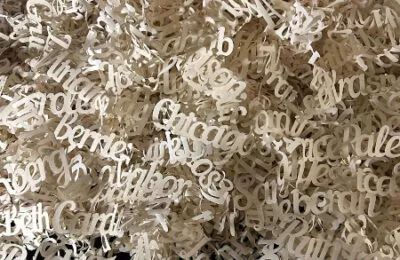
CHANUKAH EDITION
SECTION A PAGE 2
STEAMBOAT SPRINGS Har Mishpacha, which was denied permission by the Routt County government Tuesday, Dec. 9, to put up its first communal Chanukah menorah on the courthouse lawn, turned defeat into victory in a matter of hours.
In a surprise twist, county commissioners, who previously expected to approve the menorahs installation, rejected the idea after consulting with the city attorney, who deemed it a religious symbol.
Late Tuesday, Har Mishpacha President Bert Halberstadt contacted United Methodist Church of Steamboat Springs, which provides space to the congregation on Shabbat, about putting the homeless menorah on its grounds.
Church officials immediately agreed.
The historic downtown courthouse lawns brightly lit evergreen tree and Santas hut have been a holiday tradition for years, and this winter is no exception.
However, officials told the Steamboat Pilot and Today that the lights were seasonal decorations and secular not religious symbols because they stay up through the ski season.
The county consistently has avoided permitting religious displays on the courthouse lawn, Commission Chair Tim Corrigan told Halberstadt on Tuesday, according to the Pilot and Today.
Artist Randy Salky designed the striking menorah.
Linda Strear Limon, a Har Mishpacha board member, told the Intermountain Jewish News Wednesday that the negative decision really surprised us.
All our jaws kind of dropped.
She says her husband Les Limon and Halberstadt had contacted several commissioners about the Chanukah menorahs inclusion on the courthouse lawn and received very supportive responses.
We had no idea this would be an issue, Limon says.
A county commissioner had approached us Monday night and told us, Its going to go through. We thought it was a no-brainer, given that theres been a Christmas tree at the courthouse every year that I can remember.
My argument against the county is a semantic one. You can call it a holiday tree, but that beautiful large evergreen tree with all the lights is a Christmas tree.
We dont object to the tree at all. We would never seek a civil suit or even tell the county to remove the lights.
But calling it a seasonal tree seems like an excuse to make it legal.
HALBERSTADT SUSPECTS that certain members of the Routt County government view a Chanukah menorah on the courthouse lawn as a challenge to the Christian faith.
He emphasizes that the desire to erect a Chanukah menorah on the courthouse lawn in no way represents an attempt to challenge other religions or offend non-Jewish residents.
It is unfortunate because generally the congregation and I have always felt a confluence of two positive things in our community: doing the right thing; and acknowledging the holiday season.
In this instance, however, no matter how many times the good folks of Steamboat Springs say its not a Christmas tree on the courthouse lawn, it is a Christmas tree.
But its also Chanukah, and we have the right to celebrate our holiday beyond the privacy of our homes.
Halberstadt believes everyone in town concurs with this attitude with the exception of County Manager Tom Sullivan, who relied on the county attorneys interpretation of various Supreme Court rulings.
The board president feels that the majority of rulings surfacing every holiday season are situational and ambiguous at best.
They differ from case to case, says Halberstadt, who adds that religious symbols on government property are constitutional if they are presented in a non-religious context such as demonstrating community diversity.
Halberstadt is glad that Randy Salkys intriguing Chanukah menorah, which Har Mishpacha commissioned right after the High Holidays, will be located on church property at least this year.
Im looking forward to making a grander presentation and even saying a few words in Hebrew, he said happily.
Because were on church property, we are no longer bound by church, state and constitutional prohibitions against the establishment of religion.
HAR MISHPACHA, a congregation of 50 to 55 family member units, opposes the countys decision to disallow a Chanukah menorah in its midst but still appreciates interfaith efforts in the resort town.
We hold Shabbat and holiday services at United Methodist, and they have always been wonderfully accommodating, Limon says. They are terrific.
Were very disappointed with Routt County, but I wouldnt be surprised if our Chanukah menorah appeared in front of the courthouse in 2015.
We have heard from many supporters, especially our non-Jewish friends.
Rabbi Mark Asher Goodman, director of Judaic Studies at Denver Jewish Day Schools upper division and spiritual leader of Har Mishpacha, was unavailable at press time.
An email he distributed to the congregations board members expresses his concerned, proud and hopeful sentiments.
Thanks to everyone for your thoughts and energy on this matter, he wrote. I pray that this will result in the county commissioners and the town of Steamboat Springs coming to a better understanding of religious tolerance and building community in America today.
I have great faith that we can do this together, and successfully.
Har Mishpachas Chanukah menorah will be on display at the United Methodist Church of Steamboat Springs, 736 Oak St., throughout the holiday of lights.
Andrea Jacobs may be reached at [email protected].
Copyright © 2014 by the Intermountain Jewish News
















